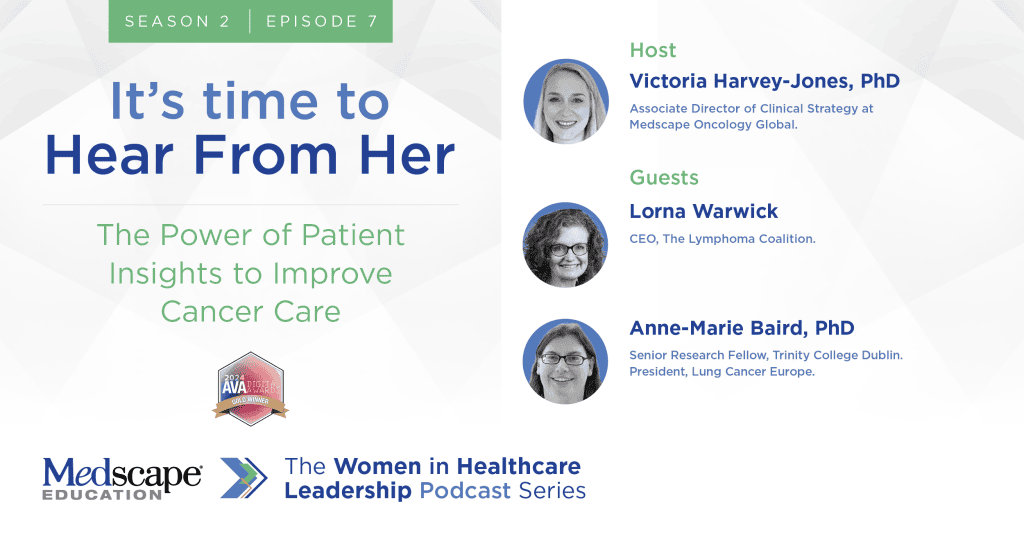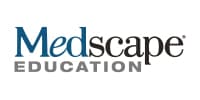The Power of Patient Insights to Improve Cancer Care
May 30, 2024 | Women in healthcare, medical education, oncology, podcast
Two global patient advocacy groups—The Lymphoma Coalition and Lung Cancer Europe— are compiling data from their communities on the real-world experience of living with cancer. What the data reveals sometimes challenges existing protocols around cancer care.

The role of The Lymphoma Coalition is to “generate and provide trusted information, knowledge, and best practices to influence and improve care” for those affected by the disease, says Lorna Warwick, the coalition’s CEO.
Our mission is to be the voice of Europeans impacted by lung cancer, says Anne-Marie Baird, president of Lung Cancer Europe.
Though they are advocating for patients with different types of cancer, these two inspiring healthcare leaders have a shared passion: to ensure that the patient voice, and patient insights, are integrated into the current knowledge base in order to improve cancer care.
Collecting insights from patient communities—through global surveys, working groups, annual gatherings, focus groups, or community advisory boards—provides valuable learnings from those living with these diseases as well as their family members and caregivers. And sometimes those learnings yield data that differs from that of academic researchers.
Warwick recalls sitting at a congress “and being invited to bring the patient perspective using our data and having this really intense discussion—disagreeing with a leading clinical expert in the area of discussion—and feeling confident because I had the data to counter him and say, ‘No, that’s not actually what the patients are telling us. There’s a gap here that needs to be addressed.’ ” And then having other doctors come up to her later and saying they want to change clinical practice based on her presentation.
Some issues that patients grapple with—nausea, fatigue, fear and anxiety, depression, body image—may be ones that doctors have minimized in previous patient conversations since they’re focused more on medical outcomes. So patients try to handle those things on their own. Warwick says that for optimal care it’s important to have those discussions about how patients are feeling. “I say this to doctors all the time: If you add one thing to the conversation with your patients it’s just to ask them, ‘What’s the one thing that’s really bothering you right now?’” What would improve your quality of life?
Warwick knows this can open up a can of worms because patients may bring up things that are totally outside of a doctor’s comfort zone. But, that doesn’t mean that we still don’t need to have the conversation and help them, she says. What Warwick wants clinicians to know is that advocacy organizations have great resources to give the patients the support that they need, and to have a better experience overall despite the medical outcomes of their disease.
As well as educating policy makers, academic researchers, and clinicians, Baird says her pan-European Organization also tries “to develop tools to equip members to do things at a national level. We want people who are able to help to build capacity, to educate, to help create awareness.” We need expert patients to have a seat at the table with pharma, for clinical trials, protocol developments, whatever it might be, Baird says. Not just at the end to develop patient advocacy leaflets. So they need to be comfortable knowing the terminology and with the conversation so they can bring their “real world, lived experience” into the mix.
This is the 2nd in a two-part conversation with Lorna Warwick, CEO, The Lymphoma Coalition and Anne-Marie Baird, President Lung Cancer Europe. To listen to Part I, click here. Hosted by Victoria Harvey-Jones, Associate Director of Clinical Strategy at Medscape Oncology Global.
To read Medscape Oncology’s white paper on patient centricity and improving cancer outcomes, click here.
Follow us for updates on upcoming podcasts and more insightful conversations.
For more information, please contact Jelena Spyropoulos (Global) or Piyali Shin (US).
About Medscape Education Medscape Education (medscape.org) is the leading destination for continuous professional development, consisting of more than 30 specialty-focused destinations offering thousands of free accredited CME and CE courses for physicians, nurses, and other healthcare professionals.
This content was provided by Medscape Education
Company Details
Latest Content from Medscape Education
Medscape Education Celebrates 30 Years of Impact with Launch of The Center of Excellence for Instructional Design
Medscape Education, a global leader in healthcare education, proudly announces the official launch of its Center of Excellence for Instructional Design—a central hub of expertise and strategic capability, dedicated to...
Medscape at the American Diabetes Association’s 85th Scientific Sessions: Your Sweet Spot for Innovation!
The American Diabetes Association’s 85th Scientific Sessions is almost here, and Medscape is ready to make an impact in the world of diabetes care! With two groundbreaking symposia, 11 dynamic...
Sharing Educational Outcomes at EHA 2025
Medscape Hematology will be at EHA 2025 to showcase the power of education impact through online abstracts, posters, and 4 symposia.
30 Years of Innovation in Education at HLTH Europe
The Medscape Education Global team will be travelling to Amsterdam for the HLTH Europe 2025 conference to showcase the power and value of CME. As pioneers in clinician education for...
Medscape Online Continuing Medical Education Led to New Diagnoses in Alzheimer’s Disease
Medscape Education has recently published a study looking at the real-world impact of online continuing medical education on Alzheimer's disease diagnosis. Read the full article here. The study, published in...
Medscape Oncology at ASCO 2025: Driving Innovation, Education & Better Patient Outcomes
Medscape Oncology is making a powerful impact at ASCO 2025, bringing seven high-impact symposia, new research insights, and the return of the Medscape Fellows Program—all aimed at educating the next...
Medscape Celebrates Eight Groundbreaking Publications at ATS 2025 International Conference
Medscape Education is proud to announce the presentation of eight innovative educational research publications at the American Thoracic Society (ATS) 2025 International Conference, held May 16–21 in San Francisco, CA....
The Future of CME in the Virtual World
The future of CME is here—and it’s personal, powerful, and primed for impact. In an era where clinician time is stretched thin, AI and digital innovation are transforming continuing medical...
Stronger Together: Medscape Education Celebrates Accomplishments in Rare Disease and Anticipates the World Health Assembly Adoption of the Resolution on Rare Diseases
Medscape Education is proud to be showcasing the power of working together in rare disease education and advocacy by co-hosting a side event at the 78th World Health Assembly in...
Intersection of Leadership and Advocacy: Driving Change Together for Women
We can’t talk about challenges to women’s reproductive health without acknowledging that we’re living in unprecedented times, say two mission-driven women’s healthcare leaders. Stephanie Sober, MD, MSHP, Global Director, Medical...





